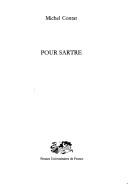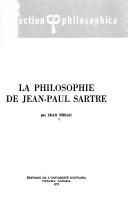| Listing 1 - 10 of 183 | << page >> |
Sort by
|
Book
ISBN: 9780230219670 0230219675 Year: 2010 Publisher: Basingstoke Palgrave MacMillan
Abstract | Keywords | Export | Availability | Bookmark
 Loading...
Loading...Choose an application
- Reference Manager
- EndNote
- RefWorks (Direct export to RefWorks)
Sartre scholars and others engage with Jean-Paul Sartre's descriptions of the human body, bringing him into dialogue with feminists, sociologists, psychologists and historians and asking: What is pain? Do men and women experience their bodies differently? How do society and culture shape our bodies? Can we re-shape them?
Sartre, Jean-Paul --- Human body (Philosophy) --- Body, Human (Philosophy) --- Philosophy --- Sartre, Jean-Paul, --- Philosophy, French --- Sartŭr, Zhan-Pol --- Sartr, Zhan-Polʹ --- Sārtar, Jān-Būl --- Sārtar, Zhān-Pūl --- Sha-tʻe --- Sartre, J.-P. --- Sa-tʻe --- Sate --- Sa-tʻe, Jang-Pao-erh --- Sate, Rangbao'er --- Sāt, Chō̜ng-Pō̜n --- Sarutoru --- Sarṭr, G'on Pol --- Chō̜ng-Pō̜n Sāt --- Cārttar, L̲ān̲-Pōl --- Сартp, Жан-Поль, --- סארטר, ג׳אן פול --- סארטר, ג׳אן פון --- סארטר, ז׳אן פול --- סארטר, ז׳אן־פול, --- سارتر، جان پول --- Guillemin, Jacques --- Sārtra, Jyām̐ Pāla --- サルトル, ジャン ポール --- Sartre, Jean-Paul, - 1905-1980
Book
ISBN: 0912632445 Year: 1981 Volume: vol *14 Publisher: Bowling Green, Ohio
Abstract | Keywords | Export | Availability | Bookmark
 Loading...
Loading...Choose an application
- Reference Manager
- EndNote
- RefWorks (Direct export to RefWorks)
French literature --- Sartre, Jean-Paul --- Sartre, Jean-Paul, --- Sartre, Jean Paul --- -Bibliography --- Criticism and interpretation --- Bibliography --- Sartŭr, Zhan-Pol --- Sartr, Zhan-Polʹ --- Sārtar, Jān-Būl --- Sārtar, Zhān-Pūl --- Sha-tʻe --- Sartre, J.-P. --- Sa-tʻe --- Sate --- Sa-tʻe, Jang-Pao-erh --- Sate, Rangbao'er --- Sāt, Chō̜ng-Pō̜n --- Sarutoru --- Sarṭr, G'on Pol --- Chō̜ng-Pō̜n Sāt --- Cārttar, L̲ān̲-Pōl --- Сартp, Жан-Поль, --- סארטר, ג׳אן פול --- סארטר, ג׳אן פון --- סארטר, ז׳אן פול --- סארטר, ז׳אן־פול, --- سارتر، جان پول --- Guillemin, Jacques --- Sārtra, Jyām̐ Pāla --- サルトル, ジャン ポール
Book
ISBN: 2870601204 9782870601204 Year: 2005 Volume: 53 Publisher: Bruxelles Ousia
Abstract | Keywords | Export | Availability | Bookmark
 Loading...
Loading...Choose an application
- Reference Manager
- EndNote
- RefWorks (Direct export to RefWorks)
Sartre, Jean-Paul --- Sartre, Jean-Paul, --- Criticism and interpretation --- Sartŭr, Zhan-Pol --- Sartr, Zhan-Polʹ --- Sārtar, Jān-Būl --- Sārtar, Zhān-Pūl --- Sha-tʻe --- Sartre, J.-P. --- Sa-tʻe --- Sate --- Sa-tʻe, Jang-Pao-erh --- Sate, Rangbao'er --- Sāt, Chō̜ng-Pō̜n --- Sarutoru --- Sarṭr, G'on Pol --- Chō̜ng-Pō̜n Sāt --- Cārttar, L̲ān̲-Pōl --- Сартp, Жан-Поль, --- סארטר, ג׳אן פול --- סארטר, ג׳אן פון --- סארטר, ז׳אן פול --- סארטר, ז׳אן־פול, --- سارتر، جان پول --- Guillemin, Jacques --- Sārtra, Jyām̐ Pāla --- サルトル, ジャン ポール --- Sartre, Jean-Paul, - 1905-1980
Book
ISBN: 9054871369 9789054871361 Year: 1996 Publisher: Bruxelles VUBPress
Abstract | Keywords | Export | Availability | Bookmark
 Loading...
Loading...Choose an application
- Reference Manager
- EndNote
- RefWorks (Direct export to RefWorks)
Sartre, Jean-Paul --- Political philosophy. Social philosophy --- Sartre, Jean-Paul, --- Sartŭr, Zhan-Pol --- Sartr, Zhan-Polʹ --- Sārtar, Jān-Būl --- Sārtar, Zhān-Pūl --- Sha-tʻe --- Sartre, J.-P. --- Sa-tʻe --- Sate --- Sa-tʻe, Jang-Pao-erh --- Sate, Rangbao'er --- Sāt, Chō̜ng-Pō̜n --- Sarutoru --- Sarṭr, G'on Pol --- Chō̜ng-Pō̜n Sāt --- Cārttar, L̲ān̲-Pōl --- Сартp, Жан-Поль, --- סארטר, ג׳אן פול --- סארטר, ג׳אן פון --- סארטר, ז׳אן פול --- סארטר, ז׳אן־פול, --- سارتر، جان پول --- Guillemin, Jacques --- Sārtra, Jyām̐ Pāla --- サルトル, ジャン ポール --- Sartre, Jean-Paul, - 1905-1980 --- Politique --- Philosophie

ISBN: 2864321297 9782864321293 Year: 1991 Volume: 2 Publisher: Lagrasse: Verdier,
Abstract | Keywords | Export | Availability | Bookmark
 Loading...
Loading...Choose an application
- Reference Manager
- EndNote
- RefWorks (Direct export to RefWorks)
Peu de temps avant sa mort, Sartre faisait paraître dans Le Nouvel Observateur une série d'entretiens avec Benny Lévy («L'espoir maintenant») qui scandalisèrent tant par leur contenu que par leur ton.Dix ans plus tard, le moment vint de les donner vraiment à lire. Benny Lévy en proposa alors un nouvel usage.Dans ce texte «ascétique», grâce à un exceptionnel mouvement de dépouillement, Sartre tente de repenser le commencement : ne faudrait-il pas déceler dès l'origine, dans le projet propre à la conscience, une tension...
Sartre, Jean Paul --- -Interviews --- Sartre, Jean-Paul, --- Sartre, Jean-Paul --- Interviews --- Sartŭr, Zhan-Pol --- Sartr, Zhan-Polʹ --- Sārtar, Jān-Būl --- Sārtar, Zhān-Pūl --- Sha-tʻe --- Sartre, J.-P. --- Sa-tʻe --- Sate --- Sa-tʻe, Jang-Pao-erh --- Sate, Rangbao'er --- Sāt, Chō̜ng-Pō̜n --- Sarutoru --- Sarṭr, G'on Pol --- Chō̜ng-Pō̜n Sāt --- Cārttar, L̲ān̲-Pōl --- Сартp, Жан-Поль, --- סארטר, ג׳אן פול --- סארטר, ג׳אן פון --- סארטר, ז׳אן פול --- סארטר, ז׳אן־פול, --- سارتر، جان پول --- Guillemin, Jacques --- Sārtra, Jyām̐ Pāla --- サルトル, ジャン ポール

ISBN: 9782130566373 2130566375 Year: 2008 Volume: *89 Publisher: Paris : Presses universitaires de France,
Abstract | Keywords | Export | Availability | Bookmark
 Loading...
Loading...Choose an application
- Reference Manager
- EndNote
- RefWorks (Direct export to RefWorks)
Sartre, Jean-Paul, --- Sartre, Jean-Paul --- Sartŭr, Zhan-Pol --- Sartr, Zhan-Polʹ --- Sārtar, Jān-Būl --- Sārtar, Zhān-Pūl --- Sha-tʻe --- Sartre, J.-P. --- Sa-tʻe --- Sate --- Sa-tʻe, Jang-Pao-erh --- Sate, Rangbao'er --- Sāt, Chō̜ng-Pō̜n --- Sarutoru --- Sarṭr, G'on Pol --- Chō̜ng-Pō̜n Sāt --- Cārttar, L̲ān̲-Pōl --- Сартp, Жан-Поль, --- סארטר, ג׳אן פול --- סארטר, ג׳אן פון --- סארטר, ז׳אן פול --- סארטר, ז׳אן־פול, --- سارتر، جان پول --- Guillemin, Jacques --- Sārtra, Jyām̐ Pāla --- サルトル, ジャン ポール --- Sartre, jean-paul --- Sartre, Jean-Paul, - 1905-1980 --- Sartre, Jean-Paul, 1905-1980
Book
ISBN: 9782251760582 225176058X 2251904565 Year: 2008 Volume: 41 Publisher: Paris : les Belles Lettres,
Abstract | Keywords | Export | Availability | Bookmark
 Loading...
Loading...Choose an application
- Reference Manager
- EndNote
- RefWorks (Direct export to RefWorks)
Jean-Paul Sartre (1905-1980), philosophe, écrivain, dramaturge et grande figure de l'intellectuel politique, aura profondément marqué le XX siècle. Penseur de la liberté et de son envers, l'aliénation, de l'engagement et de la responsabilité, du pour-soi et de l'en-soi, de la conscience et du monde, du sujet et d'autrui, de la morale et de la mauvaise foi, du groupe en fusion et de la série, de la totalité et de l'Histoire, il est une voix originale de la Phénoménologie. Pour Sartre, l'homme est tout entier libre et responsable de ses actes, sans excuse, et tout entier aliéné, parce qu'il est conscience de monde, position de soi dans une certaine situation - qui n'a de sens que pour une conscience libre. On se propose ici de parcourir son œuvre difficile et dense, de la Transcendance de l'Ego à L'idiot de la famille en passant par l'Être et le néant et Morale et Histoire, notamment. D'abord, la vie politique de Sartre pour dégager la cohérence de ses engagements. Ensuite, sa philosophie de la liberté, la découverte des philosophies de Husserl et de Heidegger, puis l'invention proprement sartrienne, la voie transphénoménale, qui permet de repenser le rapport de l'homme au monde avec le concept de cogito préréflexif, au croisement de la problématique de la liberté et de l'aliénation. Puis on restitue sa compréhension de la genèse d'une société, de l'Histoire et de ses conditions de possibilité, la force des conditionnements mais aussi la marge d'action de toute liberté. Vient après l'histoire d'une liberté en particulier, celle de Gustave Flaubert. A la suite, on traite de la morale et du sens qu'elle peut avoir pour une philosophie de la situation. On s'intéresse enfin au Sartre théoricien de la littérature, du théâtre et des arts.
Sartre, Jean-Paul, --- French philosophy - 20th century - Criticism. --- Sartre, Jean-Paul --- Sartŭr, Zhan-Pol --- Sartr, Zhan-Polʹ --- Sārtar, Jān-Būl --- Sārtar, Zhān-Pūl --- Sha-tʻe --- Sartre, J.-P. --- Sa-tʻe --- Sate --- Sa-tʻe, Jang-Pao-erh --- Sate, Rangbao'er --- Sāt, Chō̜ng-Pō̜n --- Sarutoru --- Sarṭr, G'on Pol --- Chō̜ng-Pō̜n Sāt --- Cārttar, L̲ān̲-Pōl --- Сартp, Жан-Поль, --- סארטר, ג׳אן פול --- סארטר, ג׳אן פון --- סארטר, ז׳אן פול --- סארטר, ז׳אן־פול, --- سارتر، جان پول --- Guillemin, Jacques --- Sārtra, Jyām̐ Pāla --- Critique et interprétation. --- サルトル, ジャン ポール --- Sartre, Jean-Paul, - 1905-1980
Book
ISBN: 9780521766463 052176646X 9780521152273 0521152275 9780511779497 9780511932595 0511932596 0511779496 1805409204 9781805409205 0511852444 1107208882 1282908197 9786612908194 0511931255 051192741X 0511924879 0511929919 Year: 2010 Publisher: New York Cambridge University Press
Abstract | Keywords | Export | Availability | Bookmark
 Loading...
Loading...Choose an application
- Reference Manager
- EndNote
- RefWorks (Direct export to RefWorks)
In this volume, Joseph Catalano offers an in-depth exploration of Jean-Paul Sartre's four major philosophical writings: Being and Nothingness, Saint Genet: Actor and Martyr, The Critique of Dialectical Reason, and The Family Idiot. These works have been immensely influential, but they are long and difficult and thus challenging for both students and scholars. Catalano here demonstrates the interrelation of these four works, their internal logic, and how they provide insights into important but overlooked aspects of Sartre's thought, such as the body, childhood, and evil. The book begins with Sartre's final work, The Family Idiot, and systematically works backward to Being and Nothingness. Catalano then repeats the study by advancing chronologically, beginning with Being and Nothingness and ending with The Family Idiot and an afterword on Flaubert's Madame Bovary. Readers will appreciate Catalano's subtle readings as well as the new insights that he brings to Sartre's oeuvre.
Sartre, Jean-Paul, --- Sartre, Jean-Paul --- Sartŭr, Zhan-Pol --- Sartr, Zhan-Polʹ --- Sārtar, Jān-Būl --- Sārtar, Zhān-Pūl --- Sha-tʻe --- Sartre, J.-P. --- Sa-tʻe --- Sate --- Sa-tʻe, Jang-Pao-erh --- Sate, Rangbao'er --- Sāt, Chō̜ng-Pō̜n --- Sarutoru --- Sarṭr, G'on Pol --- Chō̜ng-Pō̜n Sāt --- Cārttar, L̲ān̲-Pōl --- Сартp, Жан-Поль, --- סארטר, ג׳אן פול --- סארטר, ג׳אן פון --- סארטר, ז׳אן פול --- סארטר, ז׳אן־פול, --- سارتر، جان پول --- Guillemin, Jacques --- Sārtra, Jyām̐ Pāla --- Philosophers --- サルトル, ジャン ポール --- Arts and Humanities --- Philosophy
Book
ISBN: 9782343010564 2343010560 Year: 2013 Volume: *132 Publisher: Paris L'Harmattan
Abstract | Keywords | Export | Availability | Bookmark
 Loading...
Loading...Choose an application
- Reference Manager
- EndNote
- RefWorks (Direct export to RefWorks)
Nous admirons la plupart du temps les peintures vénitiennes du Tintoret dans des conditions défavorables : il en est de même pour les textes de Sartre sur la peinture, disséminés au gré des Situations, parfois inédits. On croit alors y trouver une théorie de l'imaginaire focalisée sur l'irréalité du monde des images. La définition des "arts non-signifiants" dans Qu'est-ce que la Littérature, tout comme les articles sur la peinture, rédigés entre 1954 et 1970 corrigent certaines idées reçues, traçant au sein de la philosophie sartrienne une nouvelle approche, plus "matiériste" de l'art
Sartre, Jean-Paul, --- Painting --- Philosophy --- Aesthetics. --- Sartre, Jean-Paul --- Sartŭr, Zhan-Pol --- Sartr, Zhan-Polʹ --- Sārtar, Jān-Būl --- Sārtar, Zhān-Pūl --- Sha-tʻe --- Sartre, J.-P. --- Sa-tʻe --- Sate --- Sa-tʻe, Jang-Pao-erh --- Sate, Rangbao'er --- Sāt, Chō̜ng-Pō̜n --- Sarutoru --- Sarṭr, G'on Pol --- Chō̜ng-Pō̜n Sāt --- Cārttar, L̲ān̲-Pōl --- Сартp, Жан-Поль, --- סארטר, ג׳אן פול --- סארטר, ג׳אן פון --- סארטר, ז׳אן פול --- סארטר, ז׳אן־פול, --- سارتر، جان پول --- Guillemin, Jacques --- Sārtra, Jyām̐ Pāla --- サルトル, ジャン ポール --- Sartre, Jean-Paul, - 1905-1980

ISBN: 0776610198 9780776610191 Year: 1977 Volume: 9 Publisher: Ottawa (Ont.) : University of Ottawa Press = Les Presses de l'Université d'Ottawa,
Abstract | Keywords | Export | Availability | Bookmark
 Loading...
Loading...Choose an application
- Reference Manager
- EndNote
- RefWorks (Direct export to RefWorks)
Sartre, Jean-Paul, --- Sartre, Jean Paul --- Sartre, Jean-Paul --- Sartŭr, Zhan-Pol --- Sartr, Zhan-Polʹ --- Sārtar, Jān-Būl --- Sārtar, Zhān-Pūl --- Sha-tʻe --- Sartre, J.-P. --- Sa-tʻe --- Sate --- Sa-tʻe, Jang-Pao-erh --- Sate, Rangbao'er --- Sāt, Chō̜ng-Pō̜n --- Sarutoru --- Sarṭr, G'on Pol --- Chō̜ng-Pō̜n Sāt --- Cārttar, L̲ān̲-Pōl --- Сартp, Жан-Поль, --- סארטר, ג׳אן פול --- סארטר, ג׳אן פון --- סארטר, ז׳אן פול --- סארטר, ז׳אן־פול, --- سارتر، جان پول --- Guillemin, Jacques --- Sārtra, Jyām̐ Pāla --- サルトル, ジャン ポール --- Sartre, Jean-Paul, - 1905-1980
| Listing 1 - 10 of 183 | << page >> |
Sort by
|

 Search
Search Feedback
Feedback About UniCat
About UniCat  Help
Help News
News